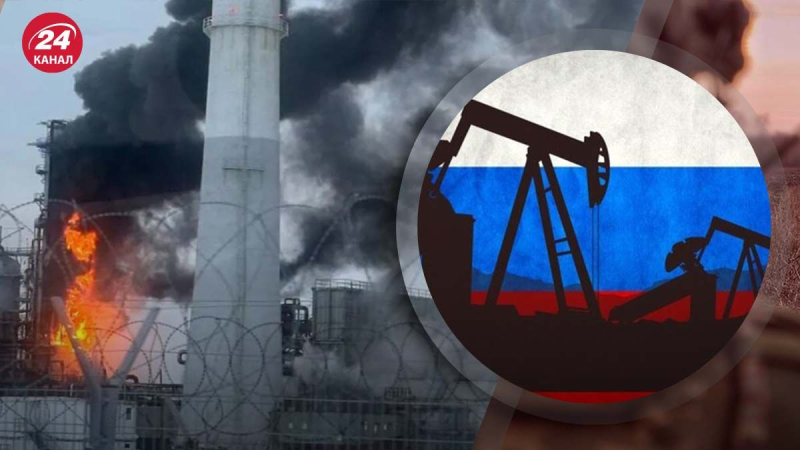Ukrainian drones damaged 12% of Russian oil refineries. Because of this, fuel shortages arose and gasoline prices increased sharply. Therefore, the Kremlin was forced to impose an embargo on the export of petroleum products for six months. Economist and executive director of the Economic Discussion Club Oleg Pendzin told 24 Channel what damage is caused to Russia by drone strikes. He noted that refineries that work to supply the Russian army are legitimate targets of the Ukrainian Armed Forces. Russian refineries that were attacked in February returned to work in March. According to Bloomberg, today 12% of Russia's capacity is still not working. On the territory of the aggressor country there are about 30 large oil refineries, that is, 12% are more than three refineries that have completely stopped their work. The result of oil refining is the production of light petroleum products: diesel fuel and gasoline. The total production of diesel fuel in Russia is almost twice the needs of the domestic market. That is, Russians produce about 50 percent more diesel than they consume. The domestic market consumes up to 92 – 93% of gasoline from what is produced at Russian refineries. for the export of petroleum products outside the country for six months due to a sharp increase in prices. Probably, in 6 months, the Russians plan to completely restore production to meet domestic needs, the economist noted. Thanks to Ukrainian drone strikes on Russian oil refineries, oil refining has decreased by approximately 300 – 350 thousand barrels per day. However, the oil refining industry of the aggressor country also suffered losses due to Western sanctions. In 2021, the total volume of average daily oil processing at Russian refineries was 9, 4 million barrels. After the introduction of sanctions, the figure dropped to 5.6 million barrels. Now drone attacks have reduced to 5, 1 million barrels. Here is a consequence of the sanctions restrictions. Let no one say that sanctions do not affect the Russian oil refining industry. They influence, from 9.4 to 5.6 million,” said Pendzin. Almost all the military equipment of the occupying army runs on diesel, which refineries produce in abundance. However, diesel fuel is also used for agricultural machinery. Now spring field work is beginning, so the demand for diesel will also be high, the economist noted. V Russia has so-called mandatory auctions for the sale of diesel for the needs of the domestic market. In parallel with the introduction of an embargo on the export of Russian gasoline abroad, the total volume of mandatory sales to the domestic market was sharply increased so as not to create a shortage for agricultural producers. Accordingly, the export potential of the aggressor country for diesel decreases. On average, Russia receives up to $200 billion from the sale of crude oil during the year. Russia received from the sale of petroleum products from 30 to 50 billion dollars. This is fantastic money. If they reduce the total volume of sales of petroleum products, or gasoline, or diesel, then this figure decreases and less money goes into the Russian budget, which finances the war in Ukraine,” Pendzin noted. For 2024, the Russian budget has allocated 120 billion dollars for the needs of the so-called “svo”. In order to find this money, the Russians have now turned to the Chinese with a request for a loan. For the previous two years, the Russians were prohibited from entering the world financial markets, so they covered the deficit at the expense of the fund welfare. Russia has used almost all of the liquid part, so now it urgently needs to look for liquid money in order to cover the deficit. The Kremlin hasn’t come up with anything better than how to raise the country’s taxes.
What losses did the oil refining industry suffer?
Can the Russians provide fuel for military equipment
Ukraine attacks Russian oil refineries
Drone attacks stopped 3 oil refineries in Russia: how critical is this for the enemy?
50

